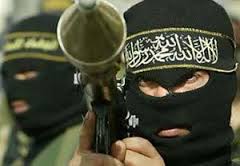 As the U.S. Congress inches closer towards authorizing the use of military force in Syria, rebel groups on the ground are preparing for an offensive that could fundamentally alter the trajectory of what is now a stalemated war well into its third year.
As the U.S. Congress inches closer towards authorizing the use of military force in Syria, rebel groups on the ground are preparing for an offensive that could fundamentally alter the trajectory of what is now a stalemated war well into its third year.
Not all of them are happy about it: al-Qaeda affiliated groups that have long sided with the rebels are worried that the U.S. and its allies might use the pretext of strikes against the regime to degrade their own abilities. According to Ayham Al Hussain, a rebel fighter from the northern city of Raqaa, which was taken over by the al-Qaeda affiliated Nusra Front in March, the jihadist groups have left their bases and melted into civilian society, fearing a U.S. strike. “The Islamists are so afraid,” he says, using a term that encompasses the Nusra Front as well as the Islamic State of Iraq and Syria, Syria’s al-Qaeda wing. “They have evacuated their positions but are still keeping some of the guards in front of their bases,” he says via Skype, noting that they have even taken down their signature black flags.
A strike on Syria’s al-Qaeda affiliates is highly unlikely—such a strategy would be difficult to pull off given the complex interlacing of various rebel groups, and nothing of the sort has been publicly discussed as officials in the Administration of U.S. President Barack Obama make their case for punitive attacks against the regime of Syrian President Bashar Assad, whom they accuse of launching a chemical weapons attack against rebel-held suburbs east of Damascus on August 21. (The government denies using chemical weapons, saying the opposition is responsible.) But opposition concerns about the pending attacks expose the growing rift between al-Qaeda-aligned rebel groups whose ultimate goal is an Islamic state in Syria and the more moderate factions who are simply fighting to overthrow the Assad regime.
The jihadist groups, by dint of their discipline, religious zeal and the inclusion of foreign combatants trained in the wars of Iraq, Afghanistan and Chechnya, tend to be the most effective fighters. They have garnered a disproportionate degree of influence for that reason, and attract attention, funding and weapons from international donors seeking a quick path to the overthrow of Assad. The more moderate Syrian rebels are conflicted; while they welcome the jihadist groups’ military prowess, they fear the militants won’t stop with Assad’s overthrow. “The Islamists are not fighting for us, they are fighting for their own agendas,” complains Mohammad Mohammad, a 25 year-old rebel fighter from Rankous, near Damascus, via Skype. “They repaint our graffiti with Islamic paintings and they want to solve our problems in Islamic courts. I want a national and civil court.”
Opposition activists worry that the growing power of the al-Qaeda-affiliated groups in areas they control could cause a backlash, tarring all the rebels with the jihadist brush and driving Syrians back into the regime’s arms. Some have gone so far as to vocalize their hopes that the U.S. might take out their al-Qaeda rivals at the same time as Assad’s military assets. “Both the regime and the fanatic groups are delaying our victory and our freedoms,” says Husam Rozisk, an opposition activist running the Tal Abyad Media Center in Aleppo. “To target both now is better than leaving [the jihadists] to have a bigger influence because it will be hard to eliminate them in the future.”
Even if such an attack is unlikely, some of the hard core jihadist groups are taking cover, just in case. “We cannot hide that we are anxious, but we are well prepared. We have evacuated all of our bases,” says Abu Omar al-Tawammi, an Aleppo-based commander from the Salafist Ahrar ash-Sham brigade, one of the most powerful factions fighting in the war, with 10,000 to 20,000 fighters. “They [the Americans] declared that the aim of the strike is to punish the regime but the real aim behind the strike is to weaken the Islamic groups on behalf of the FSA,” he tells TIME via Skype, referring to the Western backed Free Syrian Army, a loose confederation of rebel units also fighting the regime.
Mohammad, the fighter from Rankous, dismisses such fears as propaganda designed to elicit support from a population that already feels betrayed by the West for its inaction. In the wake of the chemical attacks, the jihadist groups took the lead in calling for retribution, threatening a “volcano of revenge” against the government. U.S. attacks could preempt the jihadists’ standing as the toughest kids on the block, undermining support from a population that was willing to put up with Islamic law in exchange for a strong champion against the regime. “In my area the Islamists haven’t left their bases yet but they are spreading rumors that they will be attacked to make people sympathies with them,” says Mohammad. To Reva Bhalla, Vice President of Global Analysis for Stratfor, a private intelligence and analysis organization based in Texas, the jihadist groups’ reaction may be a canny combination of defensive positioning and p.r. broadcasting. “If they can’t be sure of U.S. intentions on the whole, there may be some practicality to reducing their profile. It works in their favor to assume the role of both victim and avenger,” she says.
Such tactics may work in the short term, says Mohammad. But they won’t last. “The Islamists are defying the will of the Syrian people and they will lose by the end.” It’s just not clear how long that will take.
Time

Leave a Reply
You must be logged in to post a comment.